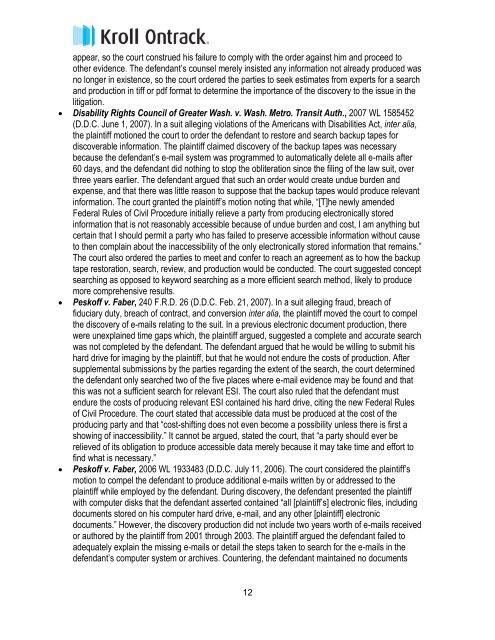Electronic Discovery and Computer Forensics Case List - Kroll Ontrack
Electronic Discovery and Computer Forensics Case List - Kroll Ontrack
Electronic Discovery and Computer Forensics Case List - Kroll Ontrack
You also want an ePaper? Increase the reach of your titles
YUMPU automatically turns print PDFs into web optimized ePapers that Google loves.
appear, so the court construed his failure to comply with the order against him <strong>and</strong> proceed to<br />
other evidence. The defendant’s counsel merely insisted any information not already produced was<br />
no longer in existence, so the court ordered the parties to seek estimates from experts for a search<br />
<strong>and</strong> production in tiff or pdf format to determine the importance of the discovery to the issue in the<br />
litigation.<br />
� Disability Rights Council of Greater Wash. v. Wash. Metro. Transit Auth., 2007 WL 1585452<br />
(D.D.C. June 1, 2007). In a suit alleging violations of the Americans with Disabilities Act, inter alia,<br />
the plaintiff motioned the court to order the defendant to restore <strong>and</strong> search backup tapes for<br />
discoverable information. The plaintiff claimed discovery of the backup tapes was necessary<br />
because the defendant’s e-mail system was programmed to automatically delete all e-mails after<br />
60 days, <strong>and</strong> the defendant did nothing to stop the obliteration since the filing of the law suit, over<br />
three years earlier. The defendant argued that such an order would create undue burden <strong>and</strong><br />
expense, <strong>and</strong> that there was little reason to suppose that the backup tapes would produce relevant<br />
information. The court granted the plaintiff’s motion noting that while, “[T]he newly amended<br />
Federal Rules of Civil Procedure initially relieve a party from producing electronically stored<br />
information that is not reasonably accessible because of undue burden <strong>and</strong> cost, I am anything but<br />
certain that I should permit a party who has failed to preserve accessible information without cause<br />
to then complain about the inaccessibility of the only electronically stored information that remains.”<br />
The court also ordered the parties to meet <strong>and</strong> confer to reach an agreement as to how the backup<br />
tape restoration, search, review, <strong>and</strong> production would be conducted. The court suggested concept<br />
searching as opposed to keyword searching as a more efficient search method, likely to produce<br />
more comprehensive results.<br />
� Peskoff v. Faber, 240 F.R.D. 26 (D.D.C. Feb. 21, 2007). In a suit alleging fraud, breach of<br />
fiduciary duty, breach of contract, <strong>and</strong> conversion inter alia, the plaintiff moved the court to compel<br />
the discovery of e-mails relating to the suit. In a previous electronic document production, there<br />
were unexplained time gaps which, the plaintiff argued, suggested a complete <strong>and</strong> accurate search<br />
was not completed by the defendant. The defendant argued that he would be willing to submit his<br />
hard drive for imaging by the plaintiff, but that he would not endure the costs of production. After<br />
supplemental submissions by the parties regarding the extent of the search, the court determined<br />
the defendant only searched two of the five places where e-mail evidence may be found <strong>and</strong> that<br />
this was not a sufficient search for relevant ESI. The court also ruled that the defendant must<br />
endure the costs of producing relevant ESI contained his hard drive, citing the new Federal Rules<br />
of Civil Procedure. The court stated that accessible data must be produced at the cost of the<br />
producing party <strong>and</strong> that “cost-shifting does not even become a possibility unless there is first a<br />
showing of inaccessibility.” It cannot be argued, stated the court, that “a party should ever be<br />
relieved of its obligation to produce accessible data merely because it may take time <strong>and</strong> effort to<br />
find what is necessary.”<br />
� Peskoff v. Faber, 2006 WL 1933483 (D.D.C. July 11, 2006). The court considered the plaintiff’s<br />
motion to compel the defendant to produce additional e-mails written by or addressed to the<br />
plaintiff while employed by the defendant. During discovery, the defendant presented the plaintiff<br />
with computer disks that the defendant asserted contained “all [plaintiff’s] electronic files, including<br />
documents stored on his computer hard drive, e-mail, <strong>and</strong> any other [plaintiff] electronic<br />
documents.” However, the discovery production did not include two years worth of e-mails received<br />
or authored by the plaintiff from 2001 through 2003. The plaintiff argued the defendant failed to<br />
adequately explain the missing e-mails or detail the steps taken to search for the e-mails in the<br />
defendant’s computer system or archives. Countering, the defendant maintained no documents<br />
12

















